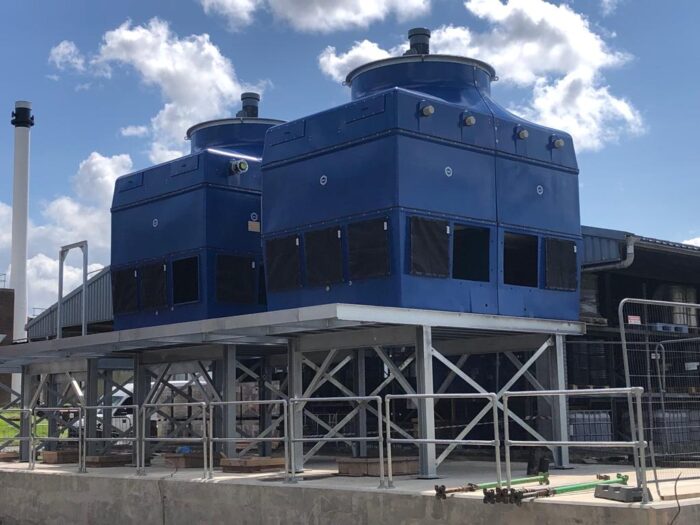
The principles of lean manufacturing have long been acknowledged across the UK manufacturing sector. Yet, despite widespread awareness, significant untapped opportunities for cost savings and operational efficiencies remain. For manufacturers with bold ambitions, the key lies in adopting a holistic approach to system design and site-wide optimisation.
The Case for a Site-Wide Audit
Comprehensive Performance Benchmarking:
By mapping all chillers, pumps, cooling towers, heat exchangers and distribution pipework, you establish baseline KPIs for various factors which can be used to guide targeted improvements.
Identifying System Inefficiencies:
Isolating and identifying “high-efficiency” improvements to the system, whether that be through pumps, motors, etc. may allow for significant operational cost savings. A full audit uncovers these inefficiencies so you can optimise the entire system.
Data-Driven Decision-Making:
Insight into site-wide measurements of temperature differentials, water usage and electrical load enables predictive maintenance of cooling systems with correctly-sized service intervals; one of the key aspects of a lean manufacturing operation.
At Vistech, we specialise in enhancing competitiveness and operational efficiency for UK manufacturers, with a focus on designing and installing world-class water cooling systems. By considering the system as an interconnected whole, rather than as individual components, manufacturers can achieve superior energy efficiency and operational performance.
System-Scale Efficiency vs Component Focus
One of the most common pitfalls in improving operational efficiency is focusing solely on the efficiency ratings of individual components. While this approach may seem logical, it often fails to deliver the anticipated returns if the overall system design has not been optimised.
Right-Sizing Over Ratings:
Selecting premium-efficiency motors or oversized chillers based solely on name-plate data can backfire if actual process loads are lower or variable. A system-scale audit ensures each asset matches real-world duty profiles, avoiding energy and capital expenditure waste.
Intelligent Control Integration:
Modern PLC and BMS platforms can modulate pump speeds, fan blades and valve positions in real time to adjust for a variable cooling load. By integrating a control philosophy with correctly backed engineering principles, sensor feedback allows you to minimise energy consumption without sacrificing process stability.
Integrated Projects & Legacy Roadmaps
Considering projects in isolation can also result in missed opportunities for synergy. A recent example from one of our clients demonstrates this. They were planning to invest in solar power to lower their electricity costs and carbon footprint. However, their calculations were based on current energy consumption, much of which came from an inefficient cooling system.
By addressing both projects simultaneously, we identified significant opportunities to reduce energy consumption through an optimised cooling system. This approach not only improved the ROI on the solar installation but also lowered the upfront capital expenditure for the solar project due to the reduced electricity demand.
Bundling upgrades for minimal disruption allows for coordinating pump replacements, VFD installations and control-system overhauls within one phased programme, minimising downtime and consolidating labour.
Phased Roadmap for Legacy Assets:
- Quick Wins: Target foul-prone heat exchangers and poorly tuned controls to capture immediate efficiency gains.
- Medium-Term Projects: Introduce right-sized pumps, energy-saving drives and enhanced monitoring during scheduled shutdown windows.
- Future-Proofing: Implement IoT sensors and analytics platforms to continuously benchmark performance and drive ongoing lean improvements.
For manufacturers operating legacy systems, adopting a phased approach to investment can deliver significant returns. Whilst not all upgrades need to occur at once, developing a roadmap for efficiency ensures that individual investments are aligned with a long-term vision. This includes optimising the control and distribution of water throughout the factory to ensure each component works seamlessly as part of a larger, efficient system.
Partner with Vistech
At Vistech Cooling Systems, we’ve guided 1000’s of UK manufacturers through this transformation using our proven three-step process:
- Site-Wide Discovery: In-depth performance analysis and health checks of a system that quantify system inefficiencies and set clear performance targets.
- Tailored System Design: Holistic engineering solutions from pipework redesign to control-philosophy integration that aligns with your lean manufacturing objectives.
- Continuous Performance Review: Ongoing data analysis and efficiency configurations ensure your cooling loop remains optimised as production demands evolve.
At Vistech, we understand the challenges manufacturers face in balancing operational demands with efficiency goals. Our 3-step process provides a clear pathway to designing and implementing high-performance systems tailored to your specific needs.
If you’re ready to unlock significant cost savings and enhance your competitiveness, arrange an initial consultation with one of our solution consultants today. Together, we can help you map out a strategy to deliver sustainable efficiency gains that boost your bottom line.
